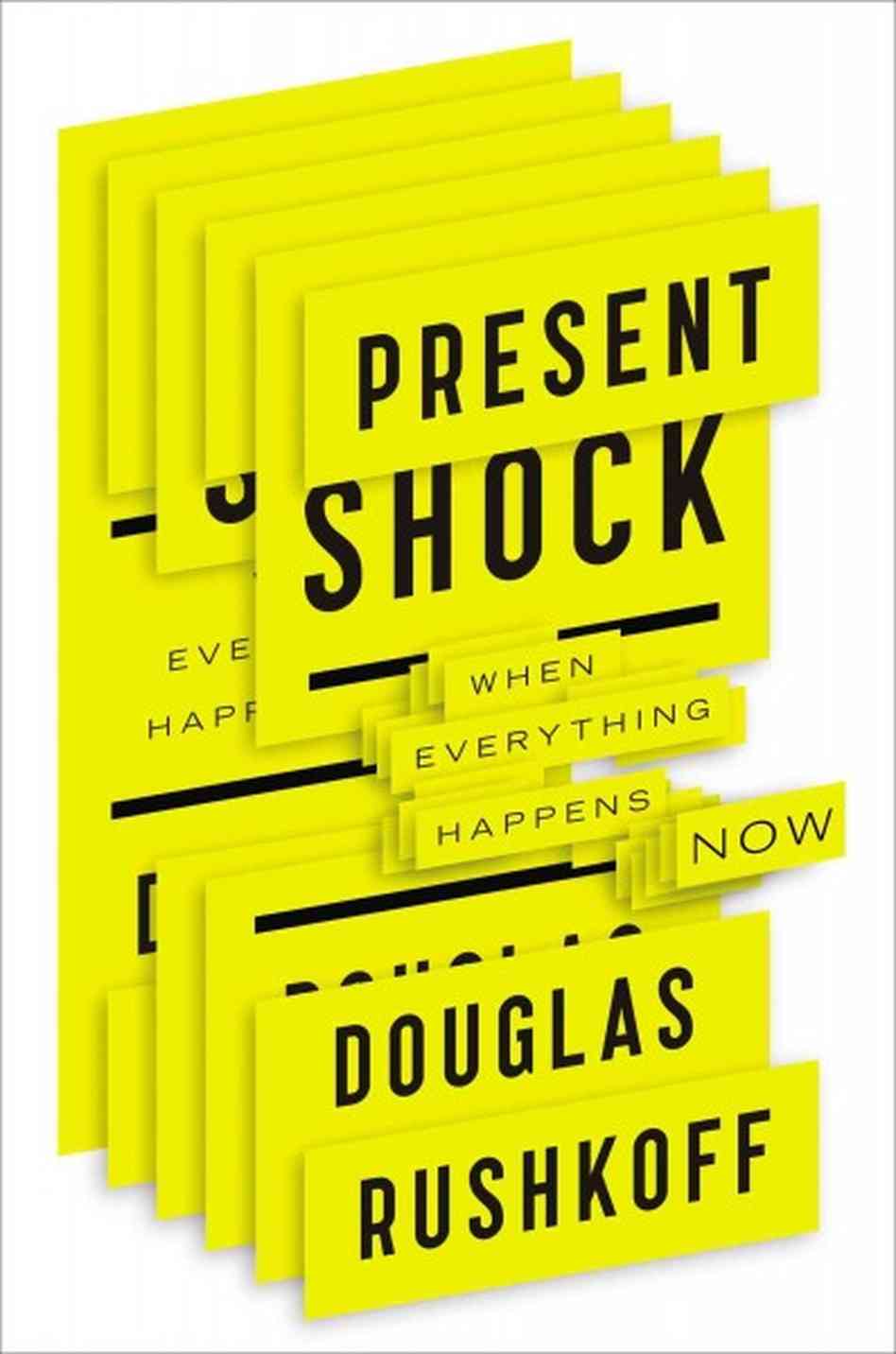
Once upon a time, the future was a place of progress, where even the darker corners of human nature were illuminated by hope of a better tomorrow and a better us. It was a future shaped by Star Trek, Star Wars, and The Twilight Zone. 2001 was supposed to be the year everything changed. We would have moon colonies, world peace, or at least nuclear annihilation so wouldn’t have to worry anymore. Yet the future we live in now often feels less futuristic and less promising of a better tomorrow than when I was a kid.
I’ve realized for quite a while that we do not live in the future of my childhood, but I’ve lacked the language to accurately describe the future we do live in until reading Douglas Rushkoff’s most recent book, Present Shock: When Everything Happens Now.
With Present Shock Rushkoff has written a uniquely vital book, one that I recommend every parent trying to make sense of the world their children are growing up in should read. He deals with the challenges and realities of the digital age, not as a luddite or alarmist, but as a well seasoned digital traveler. Rushkoff is one who not only knows the pitfalls and warning signs, but also the most rewarding spots along the information super-highway (remember, that’s what we used to call it).
Present Shock is a quasi-follow-up to the famous cultural analysis Future Shock by futurist Alvin Toffler. Toffler proposed in his book that too much change in too short a period of time would be the norm of the future. In his book, Toffler warned us of the emmnse cultural changes we would be seeing.
According to Rushkoff, we are in that future, but not exactly the future we thought it was going to be. Our society is less interested in building a better future than it is in constructing a meaningful present. “There’s a bigger now. The now of being in the presentest society” is how Rushkoff put it at a recent hear him talk at a recent WebVisions event. “We went from being a future leaning society to a presentest society.” That is, we no longer look forward to meet our needs in the future, but require all of those needs to be met in the present.
Instantaneous just isn’t fast enough anymore.
We need it now… live… real time… in your face… #YOLO. It’s not enough to get a nightly report on the news, we need our devices to inform us as soon as it happens. No time to digest or verify; we want it from the source and unfiltered. We need a web cam pointed at the vatican to watch for a puff of white smoke. We need “Google Glass” in our eyes. We need twitter feeds, and we certainly don’t have the time or the space to add the “e” in “txting”.
But this unfettered and unfiltered data comes as a price according to Rushkoff: Digifrenia. Digifrenia is where digital world is giving us so much information so fast, we can no longer turn it into knowledge, much less wisdom.

We also see digifernia in the collapse of traditional narrative structures that are being replaced by immediate narrative structures in the form of “Reality TV” where we get the simulated real-time events of other peoples lives. These narratives may be seen as simply a voyeuristic attempt to create cheap entertainment over the more expansive and expensive narrative styles of the past, but Rushkoff doesn’t simply turn his nose at these changes and denounce them. Instead, these new narratives are harbingers of new narrative styles which we are only just starting to play with. These are narratives where the individuals become the stories.
Rushkoff takes great hope in what is happing with narrative especially in the video gaming world, where gamers are building their own characters and stories actively rather than passively following along, “players become the story and delight in acting it out in real time.” he says. “The people designing the game can still communicate values if they choose to; they simply need to do it by offering choices instead of making them in advance.”
But, according to Rushkoff, narrative collapse and digifernia are also leading us to a world of fractalnoia, where we try to make sense of everything in the present tense. Actions and reactions begin coming so immediately that we loose track of cause and effect, “The hypertext link, as we used to call it, allows any fact or idea to become intimately connected with any other. New content online no longer requires new stories or information, just new ways of linking things to other things.”
This is not a simplistic self help book for the digital age. The concepts that Rushkoff is talking about are more than the superficial “Facebook bad” arguments we hear so often. He delves deep into the subject, helping the reader understand the complexities of our society as it blossoms or stagnates under the digital pressure. Yet for all it’s complexities Rushkoff’s writing style remains fun, engaging, and very geeky.
Get Present Shock: When Everything Happens Now![]()
<img style=”border: none !important; margin: 0px !important;” src=”http://www.assoc-amazon.com/e/ir?t=jasons07-20&l=as2&o=1&a=1591844762″ alt=”” width=”1″ height=”1″ border=”0″ />From Amazon.com ($15.85).


I didn’t care for the book; more specifically, I really, really didn’t care for the first chapter and never went further. It reminded me of my one-sentence review of _The World is Flat_ (Friedman wouldn’t let facts get in the way of a good story), except that in the case of _Present Shock_, Rushkoff wouldn’t let an internally consistent argument get in the way of making his point.
For people reading your column through the RSS feed, that pic of the book cover at the top is 948 x 1432 pixels in size. It ruins screen layout, and really doesn’t need to be that big.